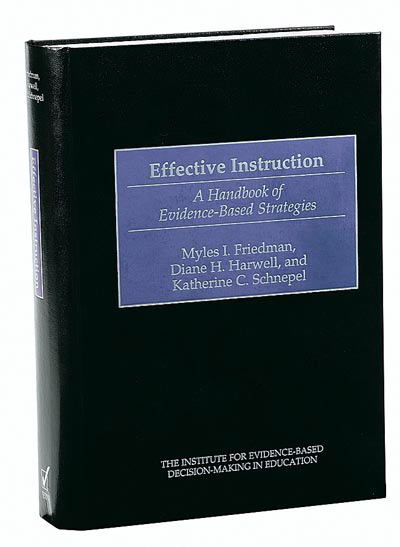
By Myles Friedman, Diane H. Harwell, and Katherine C. Schnepel
An 840-page hardcover. ISBN 0-9666588-4-2
( by Mail or Phone )
Effective Instruction is unlike the usual "tips for teachers" books that quote experts and studies selected to support the author’s bias. It is a 840-page resource book that describes in plain English 21 instructional strategies proven to significantly improve student achievement. From 66 to over 550 research studies are cited to document the effectiveness of each strategy. Research results are clearly presented and referenced in detail so that anyone can verify the conclusions. The strategies are classroom tested. They can be readily incorporated in classroom instruction as well as in pre-service and in-service teacher education programs. In addition, commonly used strategies proven not to work are exposed in the book.
Distilled from thousands of research studies amassed over the last decade Effective Instruction meets the demands of the No Child Left Behind Act for instruction to be based on solid evidence instead of personal opinion, political agendas, or compelling sales pitches.
The Easy-to-Use FormatPart II. Instructional Alerts
22. Promising Instructional Strategies
Enlisting the Control Motive
23. Questionable Instructional Strategies
Matching Student-Teacher Field Dependent/Field Independent Cognitive Styles
Ability Grouping Students
Providing Reinforcements
Providing Whole Language Instruction
Portfolio Testing
Part III. Instructional Aids
24. Controlling Classroom Disruptions
25. Developing Teaching Proficiency
26. Preschool Instruction
27. Developing Preventive Tutoring Programs
28. Remedial tutoring Programs
29. Instructional Testing and Evaluation
30. Standards for Evaluating Curricula
31. Signs of Common Disabilities
Part IV. Statistical Findings by Chapter for Each Instructional Strategy
Part V. Detailed References by Chapter
Appendices
Index of Researchers
Subject Index
About the Authors
Aileen C. Lau-Dickinson has earned a doctorate in Special
Education Administration, a Master's in Speech Science, Bachelor's in Speech Education.
She is certified in speech correction, mental retardation, visually handicapped,
speech and drama, and as a school psychologist. She has taught numerous courses in
assessment. She is currently in private practice assessing and teaching students
with learning difficulties. She received the Frank R. Kleffner Clinical Career Award
by the South
Carolina Speech - Language - Hearing Association.
Dr. Dickinson has a number of publications and presentations on developmental assessment
and instruction.
Myles I. Friedman is a Distinguished Professor Emeritus of Education at the
University of South Carolina and former CEO of the Institute for Evidence-Based Decision-Making
in Education. A renowned educator and author, his books include Rational Behavior,
Teaching Reading and Thinking Skills, Improving Teacher Education, Teaching Higher
Order Thinking Skills to Gifted Students, Taking Control: Vitalizing Education, Ensuring
Student Success, Improving the Quality of Life, and with Steven P. Fisher, Handbook
On Effective Instructional Strategies. He spent more than 30 years conducting and
applying research to improve education. Dr. Friedman's Master's and Ph.D. degrees
in Educational Psychology were earned at the University of Chicago.
Charles W. Hatch, current President of EDIE is also
President of CWH Consulting Company, Newberry, SC. He earned the Master of Arts in
Teaching at Johns Hopkins University and his Ph.D. in Educational Research and Measurement
at the University of South Carolina. He has taught college courses in tests and measurement,
statistics, and test preparation. Dr. Hatch has published an Introductory Handbook
for Statistical Package Programming and on predicting freshman retention. He has
served as a consultant on test preparation, college retention, and microcomputers
and software.
Jacqueline E Jacobs is Associate Professor, Department
of Educational Leadership and Policies, University of South Carolina. She has earned
a Bachelor's degree in Special Education and Elementary Education, a Master's in
Curriculum and Supervision, and a Doctorate in Special Education Administration.
She served as a teacher and won an Outstanding Principal Award. She teaches courses
in evaluation and measurement in special education. Her publications include articles
on the role of the principal, reading recovery, and kids killing kids in school.
Amanda Nickerson is an Assistant Professor of School Psychology in the Department
of Educational and Counseling Psychology at the University of Albany, SUNY. She has
taught classes on emotion, motivation, personality development and psychopathology,
and has worked in the Devereaux Day School, Downington, PA. She also received a doctoral
Leadership Fellowship from the U.S. Department of Education, Office of Special Education
and Rehabilitative Services. Dr. Nickerson has published on the subject of essential
skills for direct care professionals, parent and peer relationships, crisis intervention,
violence prevention, and has received a research grant to study intimacy and pro-social
behavior in early adolescents.
Katherine C. Schnepel is a self-employed research and measurement consultant.
She has earned Master's and Doctorate degrees in Educational Research and Measurement
and a Bachelor's degree in Psychology. She has served as an adjunct professor in
the Departments of Educational Psychology and Educational Leadership and Policy,
University of South Carolina. She has made presentations on testing and measurement
and mastery learning and has been employed as a research and measurement specialist
at Richland School District One, Columbia, SC. Subjects she has taught include test
item writing, interpreting test scores, measuring student achievement, and program
evaluation.